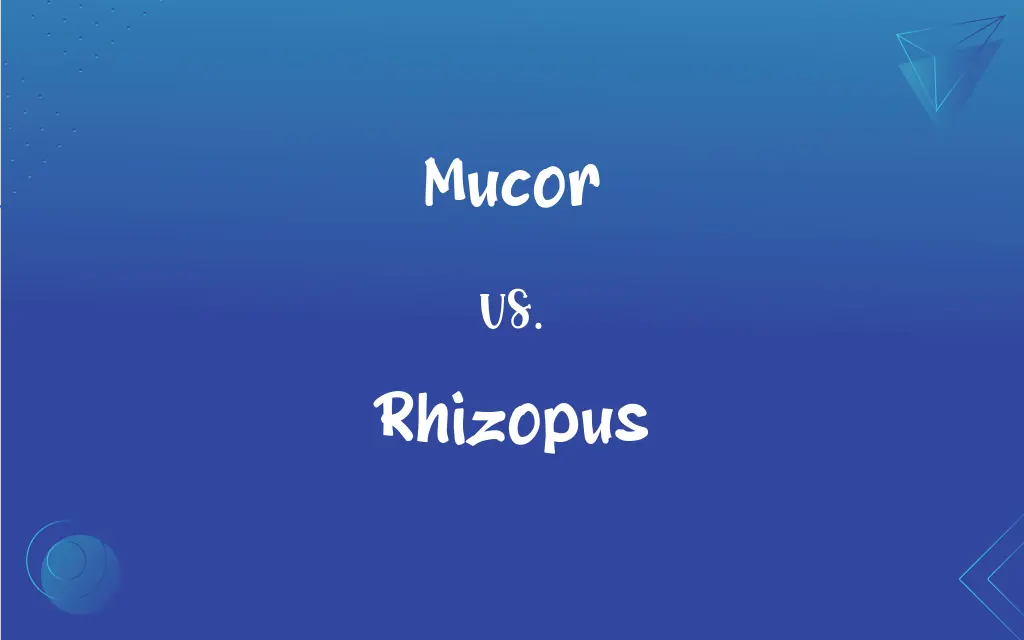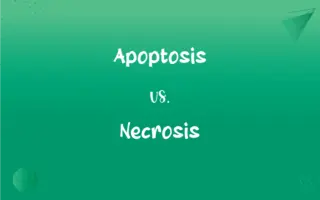Mucor vs. Rhizopus: What's the Difference?
Edited by Janet White || By Harlon Moss || Updated on October 20, 2023
Mucor and Rhizopus are both fungi; Mucor is a genus within the Mucoraceae family, while Rhizopus is another distinct genus within the same family.

Key Differences
Mucor and Rhizopus are prominent members of the fungal kingdom, specifically within the Mucoraceae family. Mucor, a genus, is widely recognized by its fast-growing characteristics and is commonly found in decaying organic matter. On the other hand, Rhizopus, also a genus, is popularly known for its role in the fermentation of Asian foods and its black bread mold species.
Mucor species, due to their rapid growth, are studied in various scientific environments, from food spoilage to industrial applications. In contrast, Rhizopus species, particularly Rhizopus oryzae, are used in the production of tempeh, a fermented soybean product.
Both Mucor and Rhizopus can be opportunistic pathogens. Mucor can cause mucormycosis, especially in immunocompromised individuals. Similarly, Rhizopus can be a causal agent of zygomycosis.
In the environment, both Mucor and Rhizopus play vital roles in breaking down organic matter, enriching soil and recycling nutrients.
Comparison Chart
Genus Belonging
Mucor is its own genus.
Rhizopus is its own distinct genus.
ADVERTISEMENT
Common Occurrence
Often found in decaying organic matter.
Known for black bread mold species.
Industrial Usage
Used in various scientific studies.
Used in fermentation of some Asian foods.
Diseases Caused
Can cause mucormycosis.
Can lead to zygomycosis.
Morphology
Typically lacks rhizoids.
Often has rhizoids anchoring it to substrates.
Mucor and Rhizopus Definitions
Mucor
A filamentous fungus known for its thread-like hyphae.
Under the microscope, the characteristic hyphae of Mucor were clearly visible.
ADVERTISEMENT
Rhizopus
Recognized by its black spores and is commonly called black bread mold.
That loaf of bread has Rhizopus mold, as evidenced by its black spores.
Mucor
A fast-growing mold that can cause diseases like mucormycosis in humans.
The patient was diagnosed with mucormycosis, suggesting an infection by Mucor.
Rhizopus
The causative agent of zygomycosis, a fungal infection.
The lab tests confirmed a Rhizopus infection in the patient.
Mucor
A genus of fungi commonly found in decaying organic matter.
The presence of Mucor in the spoiled food was undeniable.
Rhizopus
Characterized by the presence of rhizoids that anchor it to surfaces.
The rhizoids on Rhizopus help it firmly attach to bread surfaces.
Mucor
A representative genus within the Mucoraceae family.
Mucor, along with Rhizopus, belongs to the Mucoraceae family.
Rhizopus
A genus of fungi known for its role in fermenting certain foods.
Rhizopus is used in the making of tempeh.
Mucor
An environmental decomposer playing a role in nutrient recycling.
Mucor helps break down leaves, contributing to the forest's nutrient cycle.
Rhizopus
A genus within the Mucoraceae family, often found in decaying organic substrates.
Both Mucor and Rhizopus are members of the Mucoraceae family.
Rhizopus
Any of various fungi of the genus Rhizopus, including several food molds and some species used in preparing fermented foods.
Rhizopus
Any of various rot-causing fungi of the genus Rhizopus
FAQs
Are Mucor and Rhizopus related?
Yes, both Mucor and Rhizopus belong to the Mucoraceae family.
Can Mucor cause diseases?
Yes, Mucor can cause mucormycosis, especially in immunocompromised individuals.
Do Mucor and Rhizopus have industrial applications?
Yes, both are studied for various applications, from food production to scientific research.
How fast do Mucor and Rhizopus grow?
Both can grow rapidly under favorable conditions.
What is Rhizopus?
Rhizopus is a genus of fungi recognized for its black bread mold species and role in food fermentation.
Are Mucor and Rhizopus used in scientific research?
Yes, both are studied in various scientific environments for different purposes.
Is Rhizopus harmful?
While Rhizopus plays beneficial roles, it can also cause zygomycosis in humans.
How do Mucor and Rhizopus contribute to the environment?
Both play roles in breaking down organic matter, enriching soil, and recycling nutrients.
Are Mucor and Rhizopus always harmful to humans?
No, only under certain conditions, usually involving compromised immunity, can they become harmful.
Can Mucor and Rhizopus grow on bread?
Yes, especially Rhizopus which is known as the black bread mold.
Do Mucor and Rhizopus need oxygen to grow?
Both fungi are aerobic and prefer oxygenated environments.
Can Mucor and Rhizopus be seen without a microscope?
While individual structures might require a microscope, mold growth on surfaces can often be seen with the naked eye.
What is Mucor?
Mucor is a genus of fungi known for its rapid growth, commonly found in decaying organic matter.
What foods are fermented using Rhizopus?
Rhizopus is used in the fermentation of foods like tempeh.
How can one differentiate between Mucor and Rhizopus visually?
Rhizopus often has rhizoids, while Mucor typically lacks them.
Where are Mucor and Rhizopus commonly found?
Both are commonly found in decaying organic materials.
How are infections by Mucor and Rhizopus treated?
Antifungal medications are typically prescribed for infections by both fungi.
Can I find Mucor and Rhizopus in my home?
Yes, both can be found in homes, especially on spoiled food.
Do Mucor and Rhizopus reproduce through spores?
Yes, both reproduce via the production of spores.
Are there beneficial species of Mucor and Rhizopus?
Yes, several species have beneficial roles, especially in food fermentation and decomposition.
About Author
Written by
Harlon MossHarlon is a seasoned quality moderator and accomplished content writer for Difference Wiki. An alumnus of the prestigious University of California, he earned his degree in Computer Science. Leveraging his academic background, Harlon brings a meticulous and informed perspective to his work, ensuring content accuracy and excellence.
Edited by
Janet WhiteJanet White has been an esteemed writer and blogger for Difference Wiki. Holding a Master's degree in Science and Medical Journalism from the prestigious Boston University, she has consistently demonstrated her expertise and passion for her field. When she's not immersed in her work, Janet relishes her time exercising, delving into a good book, and cherishing moments with friends and family.
































































